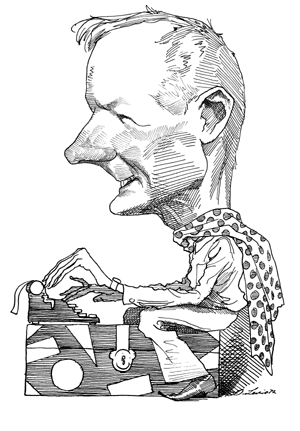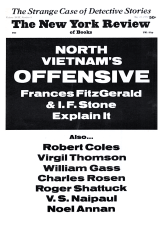Paul Bowles was in the Orson Welles-John Houseman orbit, which was discussed in the last issue, for two shows—Horse Eats Hat and Dr. Faustus—and for one play never produced, William C. Gillette’s farce Too Much Johnson—though some film-making for certain parts of that play did go on, intended for interpolation with music by Bowles. He was almost exclusively a composer during the 1930s. Earlier, in the late Twenties, he had written poetry and published in blues, transition, and other spots of the literary outfield. In the Forties he took up fiction and travel writing, through both of which he has earned money and an international public.
His autobiography is called Without Stopping. Why do they choose such shallow titles? (John Houseman’s is called Run-through, though as a life’s run-through it is short by thirty years.) Bowles’s title too I suspect of being casually selected, since his life as I know it and as it is told by him has shown no such continuity. Rather is its characteristic that of having several times changed directions.
For Bowles, though he began his life-in-art as a poet, spent a good fifteen years (more too) as a practicing composer, a critic, and a collector of folk music. The turn to travel writing was preceded by a long history of moving about in semitropical countries and of picking up languages. French, Spanish, and Arabic are those in which he is most accomplished. And in the course of his travels he picked up stories too, also acquired a knack for shaping them and for assembling others out of “found” elements, which is what most storytellers do anyway, since inventing a human character is inconceivable.
Eventually Bowles got to taping the stories told him by an Arab friend and translating these, a procedure which relates to his habitual folklore collecting. And now we see him telling his own story, as a gentleman of fifty-nine residing in Morocco, though still moving around the globe along the warmer parallels of latitude, an accomplished writer who has known everybody and been lots of places and remembers lots of stories about all those people and places.
Unfortunately these stories do not get told. Not that the experienced storyteller fails; he simply declines to tell them. He hints at their existence; that is all. So that except for an utterly charming account of his forebears and his childhood upstate near the Finger Lakes, his autobiography is a geographical décor peopled by celebrities from Krishnamurti to Gore Vidal, none of whom we ever see in close-up. And his reticence covers also himself. No friendship is declared, no love admitted. Which after all is the way Bowles has always led his life. He has been intensely loved by friends both men and women. And he has accepted their love with its attendant perquisites. Whether he ever returned it none of us has much known from services rendered, though his attentions to his wife Jane during the last decade, when mental illness has progressively alienated her, have been constant. If Paul was displeased with you he told you so, and firmly. If he was happy in your presence he laughed with joy. But nothing to him, possibly even his marriage, was ever an engagement.
And so his life, as told, unrolls like a travelogue. I would not have expected out of him either “confessions” or true-story gossip, anything indiscreet or scabrous. But Paul has always been so delicious in talk, games, laughter, and companionship, so unfailingly gifted for both music and letters, so assiduous in meeting his deadlines with good work, so relentless in his pursuit of authenticity among his own ethnic associates (and all others) that it is a bit surprising to find oneself in the same flat pattern of casual acquaintance that includes everybody else he ever knew (excepting perhaps his father, whom he seems to have pretty actively disliked, though he never broke away).
His book is a pleasure to read for its felicities of phrase, and its celebrity-column distinction is not unlike an album of photographs by Cecil Beaton. But neither its brain-work nor the emotions hinted at go deep. Lots of facts are there, all checked and verified I am sure. But their assemblage and their viewing, their choice and staging are deadpan. In this sense it is a characteristic work of twentieth-century art, which in its heroic early decades, those in which Paul Bowles grew up, gave to everything, as stylistic priority, an equalized surface tension.
This quality exists as well in Bowles’s music, for which I have admiration and which I accept. I accept it in fact with fewer reserves than I have about his fiction, which can at times appear made-up, rather than spontaneously created out of depths. But avoiding depths while searching for authenticity is harder to do in letters than in music, where feelings cannot be hidden or their absence glossed over. Bowles as a man of letters I admire, but I cannot in that role fully accept him.
Advertisement
A certain diabolism in his nature, a constant preoccupation with destructive magic, gives to the presentations of evil, which dominate his novels and other myth creations, an aspect of being either all too true, or, if not that, just a shade phony. This danger has long been clear. After a country visit at eighteen with Gertrude Stein, she summed him up as follows:
I was the most spoiled, insensitive, and self-indulgent young man she had ever seen, and my colossal complacency in rejecting all values appalled her. But she said it beaming with pleasure, so that I did not take it as adverse criticism. “If you were typical, it would be the end of our civilization,” she told me. “You’re a manufactured savage.”
She also considered him a manufactured poet, as did several others of us, Bernard Faÿ, for instance. We could not take the poetry at all. Having not seen any of it in forty years, I looked at it again in a volume recently arrived, The Thicket of Spring: Poems 1926-1969. These include twenty-one items from 1926 to 1930 (the year he was eighteen), five from the mid-1930s (two in French), nine from 1938 and 1940, two from 1969. The early ones are chiefly about landscape and cruelty, along with references to black magic as a current practice. I do not wholly reject the later poems, as I did the teen-age efforts I knew in 1931. But neither am I convinced that they are more than shallow pools. Their nature is that of “satirical verses,” as the Romantics used that term, or of what the French call vers de société, slightly shocking thoughts wittily phrased. For Bowles, though revolted by the standard violence of our time, is still in love with personal tortures and evil spells, as well as the God-created malice of snakes and tigers.
Poetry cannot be his true vocation, or he would have kept on. But not giving it up altogether and letting it be issued now can only mean that he still accepts his adolescent work. This from a man punctilious about his literary behavior, his image, could mean that having come to the end first of his musical vein and then (I am supposing) of his fictional and mythological propensities, and having faced this turning point in his life by reviewing all of it, especially the bedrock of his forebears and early years, he is moving carefully, tentatively, hopefully toward, for his sixties and beyond, seriously mining the poetic vein.
What the main theme of that might be I do not divine, since the preoccupation with evil that his novels and stories are full of is no longer fresh. He could, of course, apply it to a new theme. And the autobiography does hint, ever so gently, at such a theme, which I take to be a feeling of emptiness, indeed despair, at the final closing off of dependable communication with his wife. That he loves her deeply I cannot doubt after thirty-five years of friendship with them both. But he could not easily say it, even to her. The despair of her approaching loss, however, does come up in his book almost to the surface. The rest, except for the family matters, is one long in-color newsreel.
May that interminable newsreel wear him down, the very thought of it, till he starts making sense again! I think he did make sense in music. I have never thought his literature was for real, least of all the meager poetry. But if that vein, however thin, but mined assiduously, as he does any vein, should produce eventually even one small nugget, the whole history of Paul Bowles’s literary skills and talent would be different from what has thus far taken place.
This Issue
May 18, 1972




